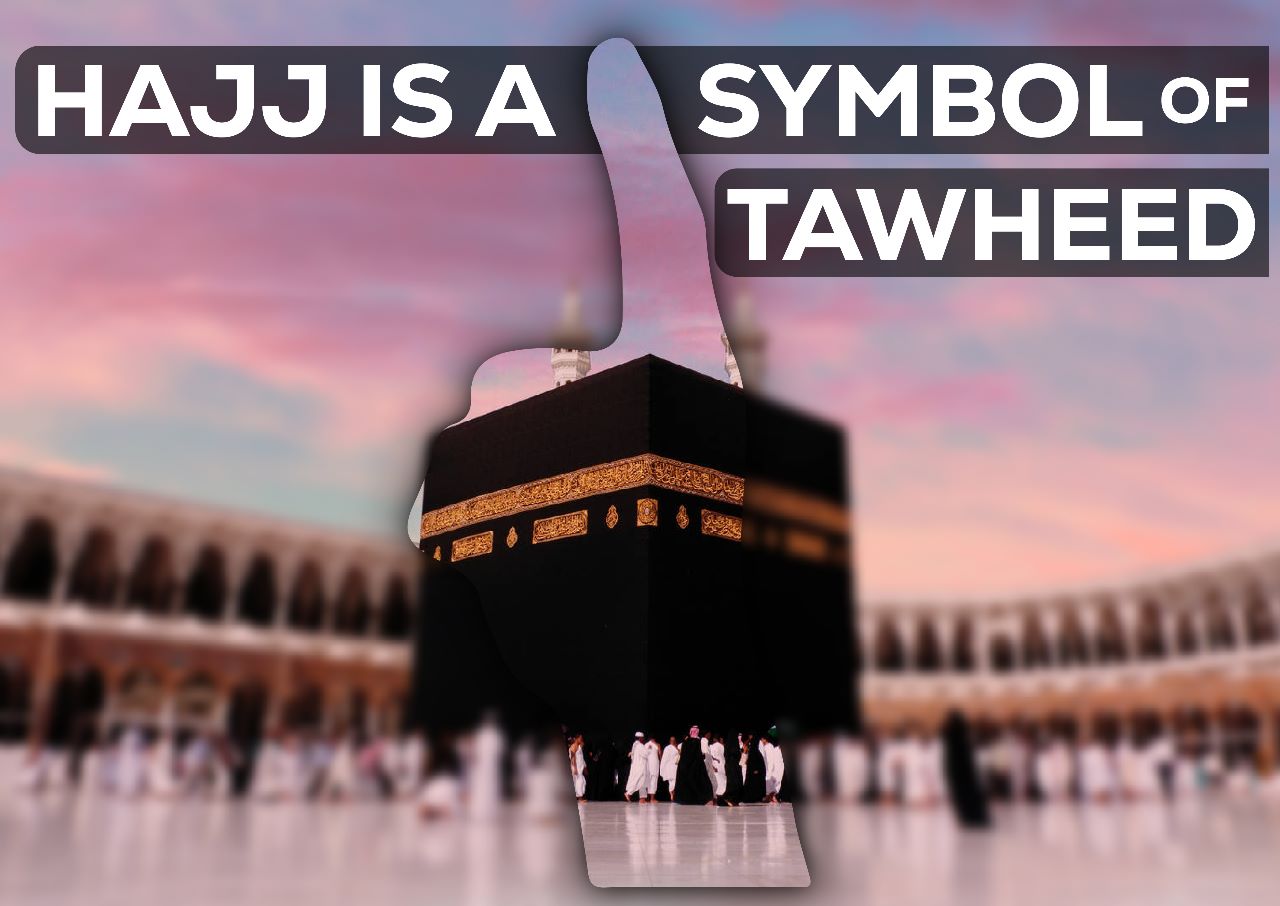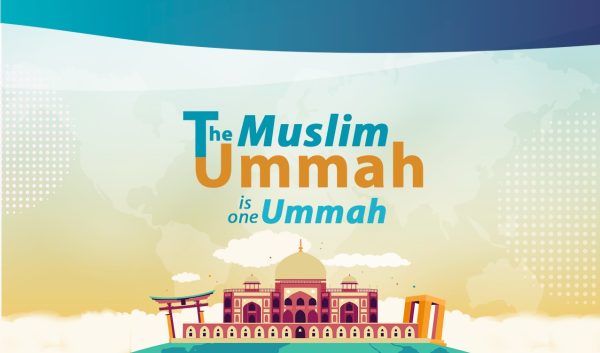When we think of Hajj, the first thing that comes to our mind is the Oneness of Allah (عَزَّوَجَلَّ) and to worship Him Alone. Hajj is by far a symbol of Tawheed. Starting from the first moment the pilgrim enters ihram, the Talbiyah begins. Men are supposed to loudly proclaim their faith while women are to recite the Talbiya in a lowered voice. But each are stating their purpose of existence and that is to worship the One and Only True Ilah (God).
Jabir ibn ‘Abd-Allah said, describing the Hajj of the Prophet (peace and blessings of Allah be upon him):
“Then he started to say the words of Tawhid,
لَبَّيْكَ اللَّهُمَّ لَبَّيْكَ، لَبَّيْكَ لاَ شَرِيْكَ لَكَ لَبَّيْكَ، إِنَّ الْحَمْدَ وَالنِّعْمَةَ لَكَ وَالْمُلْكَ لاَشَرِيْكَ لَكَ
Labbayk Allahumma labbayk, labbayka la sharika laka labbayk. Inna al-hamd wa’l-ni’mata laka wa’l-mulk, la sharika lak
(Here I am, O Allah, here I am. Here I am, You have no partner, here I am. Verily all praise and blessings are Yours, and all sovereignty, You have no partner).
(Muslim)
What does the recitation of the Talbiya really mean and why do we do it? Ihram signifies equality in eyes of Allah (عَزَّوَجَلَّ). All people are the same without the manifestation of their wealth, knowledge, upbringing or family. The only thing that differentiates them for their Rabb, is their taqwa (fearing of Allah SWT). Allah (عَزَّوَجَلَّ) says in the Qur’an:
إِنَّ أَكْرَمَكُمْ عِندَ اللَّهِ أَتْقَاكُمْ ۚ إِنَّ اللَّهَ عَلِيمٌ
Indeed, the most noble of you in the sight of Allah is the most righteous of you. Indeed, Allah is Knowing and Acquainted.
[Al-Hujurat: 13]
Proclaiming the Talbiya and repeating it throughout the Umrah and Hajj, reminds the soul to remember and acknowledge the Oneness of Allah and to be sincere towards Him. We remember where we came from and where our return will be. It is an epiphany that brings us closer to reality. It is the only truth.
The Haji starts the Hajj with words of Tawheed and continues to recite the Talbiyah with words of Tawhid and continues the days with this faith and a loud and clear message that Allah (عَزَّوَجَلَّ) is the One Ilah.
Meaning of the Talbiyah
The Talbiyah has a number of meanings, such as:
- “Labbayk Allahumma labbayk (Here I am, O Allah, here I am).” This is repeated to signify that the person presents himself, his deeds, his shortcomings and his inner most thoughts and all his actions to Allah (عَزَّوَجَلَّ). As he presents them to Him, he submits to His Magnificence as Rabb. He puts his head down and accepts his being as a human who is full of faults while His Rabb is full of Completeness and Perfection.
- “Labbayk Allahumma labbayk (Here I am, O Allah, here I am)” indicates that it is a continuous submission for as long as there is life, there is submission to Him Alone. No one else can take the place of Allah (عَزَّوَجَلَّ).
- One of the ways we understand the Talbiyah is that it confirms the love of Allah (عَزَّوَجَلَّ). We love and respect Allah (عَزَّوَجَلَّ) the way we are supposed to. A Haji has left their loved ones behind, the family and belongings to set out for this journey of a lifetime. This is only out of love of Allah (عَزَّوَجَلَّ) that one can and is able to do so.
- Talbiyah implies sincerity. A person has purified his heart to enter into the journey of Hajj. His intention should be nothing to please His Rabb and to obtain His forgiveness.
- As one recites the Talbiyah, one draws closer and closer to His Creator. The words originate from the heart, are said from the tongue, are heard by the ears and then they enter back into the heart. The body and nafs become aligned to His worship and a true sense of existence is felt as the servant of Allah (عَزَّوَجَلَّ) truly becomes His servant.
- Talbiyah as an essence of Tawhid marks the sacrifices of Ibrahim (عَلَيْهِ ٱلسَّلَامُ). Many pillars of Hajj and Umrah are based on his life and how he connected and found Allah (عَزَّوَجَلَّ). They are a symbol of his sacrifices for his religion. And the Qur’an repeatedly states how he was a firm and continuous believer in the Oneness of Allah (عَزَّوَجَلَّ). He negated shirk even when all he was exposed to as a child was that. The Qur’an says:
مَا كَانَ إِبْرَاهِيمُ يَهُودِيًّا وَلَا نَصْرَانِيًّا وَلَٰكِن كَانَ حَنِيفًا مُّسْلِمًا وَمَا كَانَ مِنَ الْمُشْرِكِينَ
Ibrahim was neither a Jew nor a Christian, but he was one inclining toward truth, a Muslim [submitting to Allah]. And he was not of the polytheists.
[Surah Ali-Imran: 67]- Talbiyah is a praise of Allah (عَزَّوَجَلَّ), which is the dearest thing with which a person may draw close to Allah. Allah Ta’ala loves those who praise Him.
- It implies recognition of the fact that the source of all our blessings is none but Allah (عَزَّوَجَلَّ). He is the source of all Rahmah.
- Talbiyah is the proclamation that everything that exists in this amazing universe is a creation of Allah (عَزَّوَجَلَّ). He is the Khaaliq (The Creator), the Maalik (The Owner) and the Mudabbir (The Disposer of Affairs).
- Another virtue of reciting the Talbiya is that we learn in a hadith: The Messenger (peace and blessings of Allah be upon him) said:
“There is no Muslim who recites the Talbiyah but whatever is to his right and to his left of stones, rocks and clods recites it with him, to the furthest point to the east and the west” – meaning from his right and his left.
(Narrated by al-Tirmidhi, 828; also by Ibn Khuzaymah and al-Bayhaqi with a sahih isnad.)
So these words are beautiful and worthy of being recited over an over again. May Allah (عَزَّوَجَلَّ) accept them from each Haji this year. Aameen.











